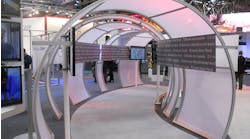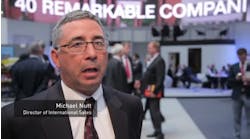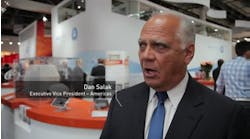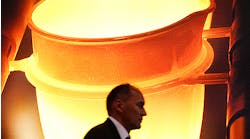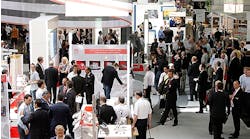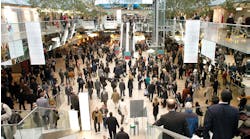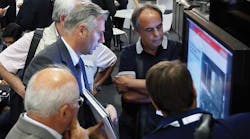Latest from GIFA
Metalcasting and related industries are enjoying a moment of historic success and potential as they approach the next edition of GIFA – 13th International Foundry Trade Fair with Technical Forum, which together with three affiliated trade fairs is expected to exceed all previous levels of participation and activity. The organizers at Messe Düsseldorf now confirm that the 2,124 registered exhibitors from around the world are the highest total in nearly 60 years since the events have been staged, and up to 80,000 visitors from anticipated to attend GIFA, Metec, Thermprocess and Newcast, June 16-20.
More than 100 million tons of castings are manufactured worldwide every year, in materials ranging from standard to exotic, including precious metals, rare materials, and emerging alloys and composites. These products reveal the essential and irreplaceable function of metalcasting as an industry — and the exclusive role played by metalcasting developers and operators in the progress of civilization.
Global industrial trends show demand for metalcastings is rising across multiple manufacturing sectors worldwide, in part because of the complexity that casting allows, as well as because of the different physical properties that can be combined in them. Small engineered parts like bone implants; complex, high-volume components for automotive manufacturing (e.g., engine blocks, pistons, housings, shafts and chassis parts), as well as large-dimension castings for maritime and industrial diesel engines, all these are manufactured by foundries and diecasters. In short, metalcasting is a high-tech industry with good prospects for future expansion.
More than that, foundries and diecasters are adopting aspects of all the process, material science, and technology trends that are influence all industries. And, they are being shaped by commercial and financial factors, too: development times are becoming shorter, while production batches are becoming smaller. Many products are required to be lightweight structures, and more efficient use of energy and raw materials is becoming a priority in terms of regulations, quality standards, and operating costs.
Exhibitors at GIFA will offer solutions in response to all of these factors. Large equipment and new process control devices; emerging technologies for molding, coremaking, melting, pouring, and handling of castings; new alloys and materials; more efficient and effective treatment processes; more accurate simulation capabilities; and faster, more reliable network and enterprise technologies —all of these will be available from exhibitors at GIFA.
This year, all four Düsseldorf events will carry a renewed emphasis on the resource reduction and energy efficiency. New developments and technologies for maximizing efficiency levels and reducing CO2 emissions (so important in energy-intensive like metalcasters) will be presented. The ecoMetals campaign organized by Messe Düsseldorf, exhibitors will showcase exhibitors’ innovations for low-energy production, material and resource efficiency, and applications of renewable energy and optimized energy control.
The GIFA presentation will have 898 exhibitors from 46 countries and cover five vast exhibition halls. With the Technical Forum and GIFA Conference, the program also will include opportunities for discussion and understanding reflecting the full range of academic and industrial progress.
Helping to continue the discussion will be Newcast – the 4th International Trade Fair for Precision Castings – which will offer visitors the chance to see products and capabilities from 408 exhibitors in two exhibition halls. The Newcast Forum will provide insights into the technical and scientific progress in foundry engineering.
In a similar vein, Metec – 9th International Metallurgical Trade Fair with Congresses will be a venue for primary steelmaking processes and technologies; and Thermprocess – 11th International Trade Fair and Symposium for Thermo Process Technology will bring together the industrial furnace, industrial heat treatment, and thermal processing experts and technologies.
A single admission to GIFA, Newcast, Metec, and Thermprocess can be purchased online at reduced rates: €45 for a 1-day ticket (€60 onsite) and €98 for a 5-day ticket (€130 onsite). All tickets include free use of all public transportation within the Düsseldorf regional transit network. For information about all four trade fairs and the ancillary program, visit www.tbwom.com; Düsseldorf hotel and travel information is available via TTI Travel Inc., tel. 866-674-3476; [email protected]; or www.traveltradeint.com
